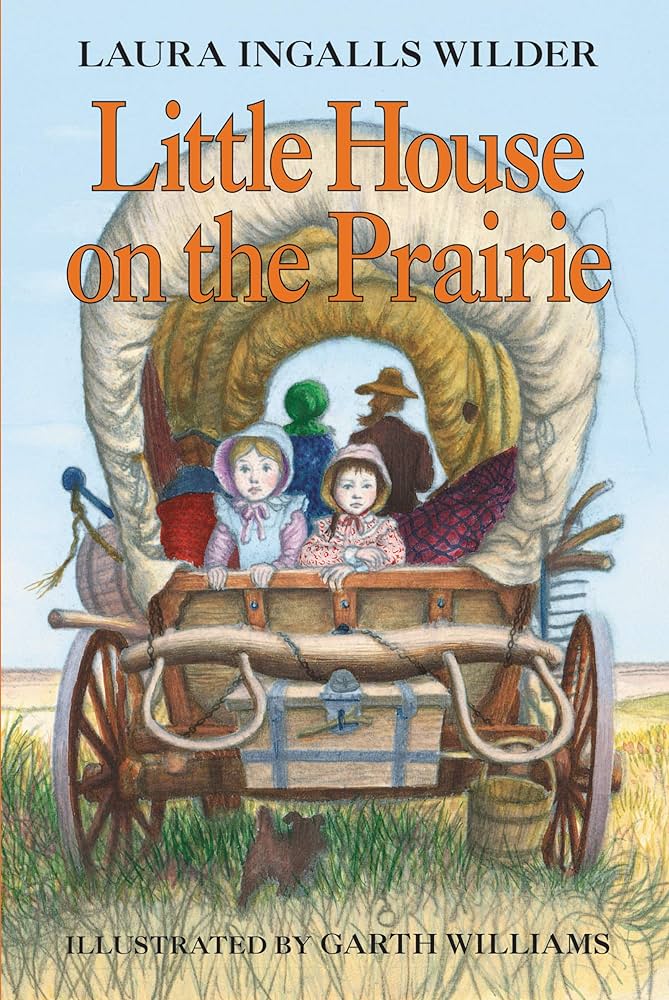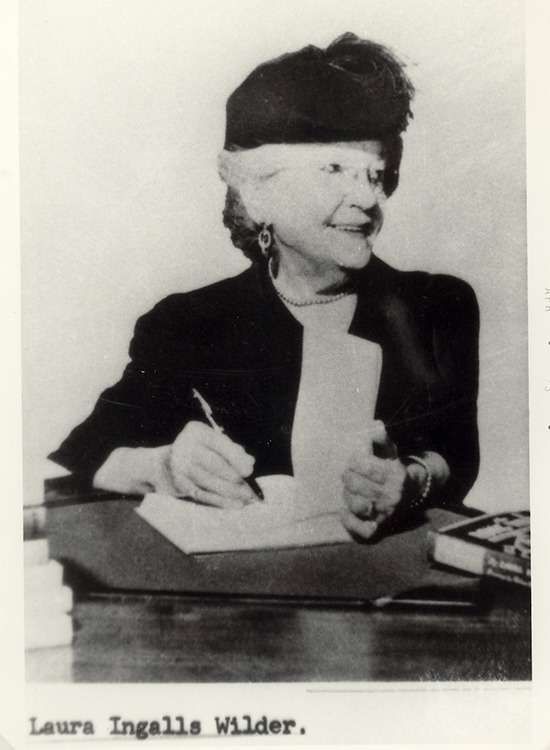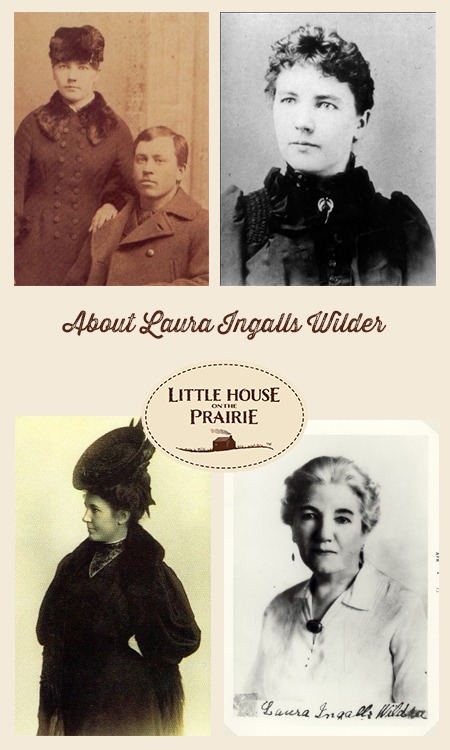As I have mentioned in my Sunday Bookends posts recently, Little Miss and I have been reading Little House on the Prairie by Laura Ingalls Wilder before bed. I read the books as a child and I didn’t understand how horrible the references to Native Americans in the book sounded back then. It is also possible my Mom explained to me what I have been explaining to my daughter this week, which is that the fear the Ingalls had of the Native Americans was really a fear of the unknown. They were drawing their views of the Native Americans from stories they had heard and not personally experienced in some cases.
This past week, I made reading the book an educational experience in addition to being an entertaining one. I also explored the reason behind what some would call “racist language” in Wilder’s books by doing what so many of us do these days — I Googled it.
As an adult re-reading Little House on the Prairie, I was taken aback by what Wilder wrote about the Native Americans. I didn’t remember the negative descriptions from when I read it all those years ago. Part of me had considered abandoning the book, so I didn’t have to discuss such a difficult topic with a 6-year-old, or at least skipping those sections. It was hard to skip the sections, however, since so much of the book is about the Native Americans and the Ingalls’s encounters with them. I’m glad I didn’t abandon the book, because then I would have missed those moments where the fictional version of Wilder challenges the views her mother and others living on the prairie have of the Native Americans.
One reason the real Laura couldn’t have questioned the negative views of the Native Americans when her family lived on the prairie is because she was actually only 2 when they moved to Kansas and around 4 or 5 when they left. In the fictional children’s book, she portrays herself as around 8 or 9. She also writes that baby Carrie was alive, but in reality, Carrie had not even been born yet.
Laura Mclemore points out on The Little House on the Prairie website that it is important to understand the history behind Wilder’s story when considering how she writes about the Osage. For one, Wilder’s mother held a fear of the Osage people because of a massacre that occurred in Minnesota, near where the Ingalls had lived before moving to Kansas, around 1862. That massacre occurred when the Sioux and Dakota tribes rose up against the settlers after many of the men left to fight in the Civil War. Laura’s mother and their neighbors, the Scotts, remember that massacre when they expressed anger and fear toward the Osage people, even though they are a different tribe.
It’s also important to remember that Wilder wasn’t actually writing an autobiography when she wrote her children’s books. While there were some authentic life experiences, as well as actual people in the books, Wilder was actually writing historical fiction using her real family as the basis for the stories.
In 2018, Wilder’s name was stripped of a literary award named after her by the American Library Association because many believed her depictions of both Native Americans and African Americans were racist. The decision to remove her name bothered some people, including Amy S. Fatzinger from the magazine The Atlantic.
“The books indeed include several pejorative passages about Native people that reflect ‘dated cultural attitudes.’” Fatzinger wrote. “At times, they also work to dispel myths about American westward expansion; some scenes illustrate the complexity of race relations on the frontier and remind readers that countless families like the Ingallses were illegally occupying Native lands. As a result, Wilder’s approach can leave readers with conflicting messages about Native characters, requiring a more nuanced consideration of the texts themselves.”
While reading the book this week to Little Miss, I could see what Fatzinger means about scenes showing the complexity of race on the frontier. The various descriptions of Native Americans are definitely shocking by today’s standards and show how misguided the Ingalls family and other settlers were about the tribes living around them.
While Wilder relayed some of the more prejudiced comments she heard about Native Americans while growing up, she also did something other writers of the time didn’t do, Fatzinger wrote, and that was to point out that white settlers had illegally moved onto land occupied by the Osages. Charles Ingalls tells his family they are moving to “Indian Country” because politicians in Washington had sent word that the land would soon be free of Native Americans. Yes, just like today, politicians were adept at stirring up trouble and leaving people hurt in the wake of their ineptitude.
“Even readers who find such scenes troubling might assume that Wilder was simply repeating the attitudes of her time,” Fatzinger wrote in her article. “A closer look, though, reveals that she usually presents misconceptions about frontier life only to later challenge them; similarly, negative views of Native people are often juxtaposed with more favorable ones. In Little House on the Prairie, young Laura listens to various perspectives about Native people uttered by the adults around her and questions them. Laura asks her Ma, for example, why they’re traveling to Indian Territory if she doesn’t like Indians. It’s a question that highlights the absurdity of the events that follow, like when the Ingallses huddle in their house petrified of the Osage neighbors whose land they are attempting to appropriate.”
Through questions she asks her parents, Wilder also shows that her younger self had doubts about whether the Native Americans were “evil”, even though she had a very obvious fear of them and referred to them as “wild”, “smelly,” and “savage.” She writes that Ma was always leery and upset by the Native Americans, especially when they entered the home uninvited but Pa was much more laid back, saying more than once, “As long as we are peaceful toward them, they will be peaceful toward us.” Of course, he also had a prejudiced view of them because at one point he almost calls them devils, but Ma cuts him off so he doesn’t make the children afraid.
I believe Wilder wrote her books from the perspective of a child who had a fear of the unknown which included Native Americans, but also from the perspective of a woman born in 1867.
Her writing mainly focuses on what others thought of Native Americans and she relays their views through the eyes of a child trying to make sense of it all. She doesn’t leave those racist ideas to sit there alone, without explanation. She addresses them again as you progress through the book. When the neighbors say, “The only good Indian is a dead Indian,” Laura’s father disagrees, especially when Soldat Du Chene, a member of the Osage tribe talks the rest of the Osage people out of declaring war on the white settlers.
“No matter what Mr. Scott said,” Laura writes. “Pa did not believe the only good Indian was a dead Indian.”
Keeping in mind the need to offer context to Laura’s story and instead of throwing the baby out with the bath water, I took Mclemore’s suggestion to use the books as a teachable moment. One night before bed, I told Little Miss who the Native Americans were and how they lived in our country before the white Europeans.
I wasn’t sure how she would respond to my story of how the white Europeans chased many Native Americans off their land. I hoped she wouldn’t demonize either side.
Little Miss, 6, is sharp, though, so I really shouldn’t have been surprised when she said, “I’m guessing the white people started the war.”
Ouch.
I hadn’t even mentioned war. I would imagine she heard about that in a cartoon or in lessons I’ve taught her brother about similar subjects.
I told her that sometimes the white settlers started the war because they wanted the land and sometimes Native Americans started the wars because they were upset that the white settlers had taken their land and hurt their people.
I also explained that what the white Europeans did was wrong and that some of them may have been our ancestors (especially on my dad’s side where we have traced our family back to very early settlers in Connecticut), but that doesn’t mean we are to blame for what happened.
We do, however, need to remember that dark part of our history so we don’t repeat it. We also need to recognize that the land we now live on was land once occupied by people who settled this land long before our ancestors did.
After I told her that the land we lived on now was probably where members of the Iroquois nation lived and that we would study them soon in our history, her curiosity was piqued.
“You have hooked me,” she announced. “Now I want to know more.”
Five minutes later she was asleep with my promise that we would soon learn more about Native Americans. The next day we watched a video by a Native American woman on YouTube about the Native Americans of the Northeast and those of the Midwest.
Little Miss enjoyed it but looked up after the woman talked about the women of the tribe cooking and cleaning and scraping the buffalo hides and said, “I’m guessing this is when the men thought women couldn’t do the same thing that men could do, right?”
She’s a little too smart for her own good at times.
I agree with Mclemore’s suggestion for parents who would like to teach their young children about life in the 1800s and that is to not ignore Wilder’s books.
“I suggest that rather than banning books or refusing to read them, we use them as a platform for examining the history of the United States,” she writes. “What better way to learn our history than by reading a classic like Little House on the Prairie and using it as a platform for discussion?”
Incidentally, I am taking this same approach with To Kill A Mockingbird which I am reading with my 14-year-old son for his English class.
I also agree with Fatzinger that we shouldn’t remove Wilder’s references to Native Americans from her writing, or in fact, remove any references to races that we disagree with. By doing this we are effectively removing any mention of the race at all, which closes the door to discussions about why stereotypical views of a race are wrong.
You can learn more about Laura Ingalls Wilder at http://www.littlehouseontheprairie.com and more about Fatzinger’s view of Wilder’s work on The Atlantic site.
Discover more from Boondock Ramblings
Subscribe to get the latest posts to your email.




I appreciate this article, her books have so much merit as well as lessons for us all. I “lived” those books as a child reading and rereading them from my weekly trips to the library. Thank you.
LikeLiked by 1 person
Same here! I hid under covers reading them at night and I remember having nightmares over the scene with the grasshoppers walking over and through the house to leave the area! Yuck!
LikeLike
In today’s world, readers need to tred carefully when encountering a novel’s views which are based upon a perspective from years past. In reality, we learn more about how far American culture has advanced . . . yes, we need to make even more progress. We cannot lump authors such as a Wilder or a Twain into a banned list of authors.
LikeLiked by 1 person
I totally agree!!
LikeLike
There’s a book called the “Earth is Weeping” by Peter Cozzens that provides a lot of context. Basically moral evolution is a slow process and neither the white man or the indigenous person from the 1800s comes close to meeting today’s moral standards and it’s unfair to judge either by them. European settlers did some undoubtedly bad stuff to Natives but the Natives were also not particularly saintly. They were separate nations that stole each other’s land before the white man came and as part of their war campaigns would rape women of other nations and burn them and their children alive. The white man was no better of course – because people are people and back then they were all bad based on contemporary standards.
LikeLike
Pingback: Sunday Bookends: Reading novellas and Watching Spring Bloom | Boondock Ramblings
Interesting perspective, Lisa. When we place ourselves in the shoes of those in historical times and places, we better understand the fears, the fights, and faults. Reading this, I was reminded of an aunt of mine, 91 years young. Her parents were Texas pioneers. The hardships alone shine a spotlight on so much which developed attitudes and expectations. She wrote a book of her early memories at the homestead. She told me she had to leave out so much due to her fear many would be offended by the words used in her time. Here’s to truth of the printed word. God’s grip – Alan
LikeLiked by 1 person
Thank you for sharing this wonderful post. I’ve read all of Wilder’s books as a child. I reread them when I was older. I recently reread The Long Winter.
People are judging Laura Ingalls Wilder on the knowledge and type of society standards we have now. I think it is sad that this even has to be mentioned. It is sad that people do not take this in to consideration. They are quick to point the finger and judge based on what they know about life as it is now. We have the benefit of going to school with people of other people groups. We can read books, magazine articles, and newspapers to inform us of people outside our own race or country. We can mingle in society (including places of employment) with other people groups.
My daughter-in-law is Apache. She and I have talked about this topic before. I wanted to hear about her experiences of prejudice. She has encountered some-including from her own half siblings. These siblings condemned her because her skin color was darker than their skin coloring-her own family?
LikeLiked by 1 person
Ignore the questions mark
typo
LikeLike
I find it so crazy when I hear that some who are African American are also judged if their skin is too white and now they are judged if they don’t have the “right” political views. I don’t understand how anyone can say they are fighting racism while being racist at the same time. It seems like no matter what we do these days there is always someone to tell us we are not enough. Thankfully God tells us we are.
LikeLiked by 2 people
Ok, I’m sorry. But this is one of those things that is kind of a pet peeve for me. (I’ll try to keep it short! 🙂 ) Laura Ingalls Wilder was born in a different time. Her experiences, thoughts, beliefs, etc. were shaped by that time period. That doesn’t make her material any less worth our time. We should be smart enough (and have parents to help guide us!) to understand that and realize that things weren’t always the same. History has a place and if we erase it then we are doomed to repeat it. People can’t change the past. But we can learn from it, as long as we don’t just ignore it. (I’ll stop here, lol.) Thank you for sharing! God Bless!
LikeLiked by 3 people
I agree with you! We need to learn from the past, not bury it!
LikeLiked by 1 person
Yes and yes and yes. Lisa, this is brilliantly written. I 100% agree – we can’t make history just go away by not acknowledging it.
What a great moment you had too, with Little Miss. ☺️
LikeLiked by 3 people
Thank you. Too many of us want to bury our heads in the sand and not face the issues head on. It’s easy to do that but not healthy
LikeLiked by 1 person